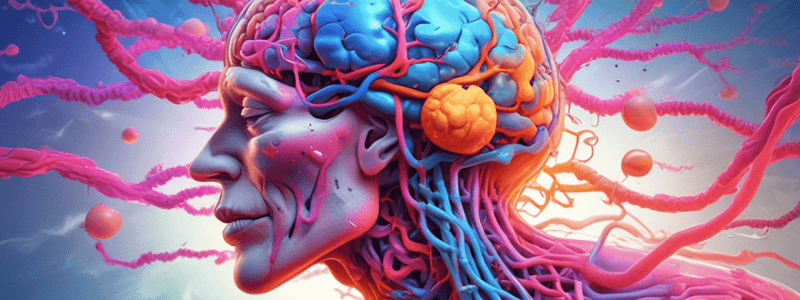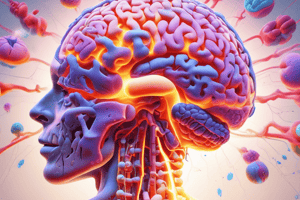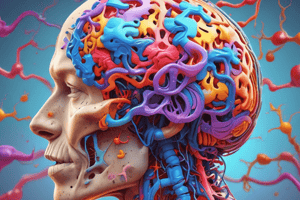Podcast
Questions and Answers
Match the neurological disorder with its description:
Match the neurological disorder with its description:
Stroke = Sudden loss of blood flow to the brain resulting in brain cell damage Traumatic Brain Injury = Head injury causing disruption in normal brain function Multiple sclerosis = Autoimmune disease affecting the central nervous system Guillian Barrie syndrome = Condition characterized by acute muscle weakness
Match the neurological disorder with its symptom:
Match the neurological disorder with its symptom:
Amyotrophic lateral sclerosis (ALS) = Progressive muscle weakness and paralysis Myasthenia gravis = Progressive muscle weakness and fatigue that improves with rest Parkinson’s = Movement disorder characterized by tremors and rigidity Dystonia = Involuntary muscle contractions causing repetitive movements or abnormal postures
Match the cause with the neurological disorder:
Match the cause with the neurological disorder:
Medications = Common cause of delirium Illicit substances (e.g., cocaine) = Another common cause of delirium Renal insufficiency = Risk factor for delirium Drug-drug interaction = Risk factor for delirium
Match the risk factor with the neurological disorder:
Match the risk factor with the neurological disorder:
Signup and view all the answers
Match the symptom with the neurological disorder:
Match the symptom with the neurological disorder:
Signup and view all the answers
Match the condition with its characteristic:
Match the condition with its characteristic:
Signup and view all the answers
Match the following with the correct condition: Progressive decline in memory functions associated with decline in other cognitive functions (e.g., language, calculation)
Match the following with the correct condition: Progressive decline in memory functions associated with decline in other cognitive functions (e.g., language, calculation)
Signup and view all the answers
Match the following with the correct symptom: Fluctuation in behaviors such as hallucination, agitation, confusion
Match the following with the correct symptom: Fluctuation in behaviors such as hallucination, agitation, confusion
Signup and view all the answers
Match the following with the correct complication: Aspiration pneumonia
Match the following with the correct complication: Aspiration pneumonia
Signup and view all the answers
Match the following with the correct management approach: Supportive care and supportive environment
Match the following with the correct management approach: Supportive care and supportive environment
Signup and view all the answers
Match the following with the correct consequence: Cognitive enhancers medications
Match the following with the correct consequence: Cognitive enhancers medications
Signup and view all the answers
Match the following with the correct intervention: Avoiding physical restraints
Match the following with the correct intervention: Avoiding physical restraints
Signup and view all the answers
Match the following complications with Guillain-Barre Syndrome (GBS):
Match the following complications with Guillain-Barre Syndrome (GBS):
Signup and view all the answers
Match the following symptoms with Amyotrophic Lateral Sclerosis (ALS):
Match the following symptoms with Amyotrophic Lateral Sclerosis (ALS):
Signup and view all the answers
Match the following interventions with their respective purpose:
Match the following interventions with their respective purpose:
Signup and view all the answers
Match the following statements with the correct disease:
Match the following statements with the correct disease:
Signup and view all the answers
Match the non-pharmacological treatment with its description:
Match the non-pharmacological treatment with its description:
Signup and view all the answers
Match the medications with their effects on communication:
Match the medications with their effects on communication:
Signup and view all the answers
Match the management steps for communication difficulties resulting from drug adverse effects:
Match the management steps for communication difficulties resulting from drug adverse effects:
Signup and view all the answers
Match the following management approach with the respective disease:
Match the following management approach with the respective disease:
Signup and view all the answers
Match the following symptoms with the respective disease:
Match the following symptoms with the respective disease:
Signup and view all the answers
Match the following factors with the respective disease:
Match the following factors with the respective disease:
Signup and view all the answers
Match the following needs with the respective disease:
Match the following needs with the respective disease:
Signup and view all the answers
Match the following symptoms with the correct movement disorder:
Match the following symptoms with the correct movement disorder:
Signup and view all the answers
Match the management approach with the respective neurological disorder:
Match the management approach with the respective neurological disorder:
Signup and view all the answers
Match the symptom management with the correct movement disorder:
Match the symptom management with the correct movement disorder:
Signup and view all the answers
Match the FDA-approved medication with its respective usage:
Match the FDA-approved medication with its respective usage:
Signup and view all the answers
Match the environmental factor with the respective degenerative disease:
Match the environmental factor with the respective degenerative disease:
Signup and view all the answers
Match the hallmark symptoms with the correct movement disorder:
Match the hallmark symptoms with the correct movement disorder:
Signup and view all the answers
Match the following conditions with their respective complications:
Match the following conditions with their respective complications:
Signup and view all the answers
Match the following management approaches with their respective conditions:
Match the following management approaches with their respective conditions:
Signup and view all the answers
Match the following symptoms with their respective conditions:
Match the following symptoms with their respective conditions:
Signup and view all the answers
Match the following consequences with their respective conditions:
Match the following consequences with their respective conditions:
Signup and view all the answers
Match the following medications with their effects on communication:
Match the following medications with their effects on communication:
Signup and view all the answers
Match the following complications with their respective diseases:
Match the following complications with their respective diseases:
Signup and view all the answers
Match the following neurological disorders with their descriptions:
Match the following neurological disorders with their descriptions:
Signup and view all the answers
Match the following conditions with their associated risk factors:
Match the following conditions with their associated risk factors:
Signup and view all the answers
Match the following neurological disorders with their common symptoms:
Match the following neurological disorders with their common symptoms:
Signup and view all the answers
Match the following neurological disorders with their management approaches:
Match the following neurological disorders with their management approaches:
Signup and view all the answers
Match the following neurological disorders with their potential complications:
Match the following neurological disorders with their potential complications:
Signup and view all the answers
Match the following neurological disorders with their causes:
Match the following neurological disorders with their causes:
Signup and view all the answers
Match the following age-related change with its description:
Match the following age-related change with its description:
Signup and view all the answers
Match the following statistic with its relevance:
Match the following statistic with its relevance:
Signup and view all the answers
Match the following condition with its example often mistaken as part of aging:
Match the following condition with its example often mistaken as part of aging:
Signup and view all the answers
Match the following age-related change with its impact on disease presentation:
Match the following age-related change with its impact on disease presentation:
Signup and view all the answers
Match the following age-related change with its contribution to adverse drug reactions:
Match the following age-related change with its contribution to adverse drug reactions:
Signup and view all the answers
Match the following common issue with its impact on communication in older adults:
Match the following common issue with its impact on communication in older adults:
Signup and view all the answers
Match the non-pharmacological treatment with its description:
Match the non-pharmacological treatment with its description:
Signup and view all the answers
Match the medication with its effect on communication:
Match the medication with its effect on communication:
Signup and view all the answers
Match the symptom with the neurological disorder:
Match the symptom with the neurological disorder:
Signup and view all the answers
Match the management approach with the respective disease:
Match the management approach with the respective disease:
Signup and view all the answers
Match the condition with its characteristic:
Match the condition with its characteristic:
Signup and view all the answers
Match the following symptoms with the respective disease:
Match the following symptoms with the respective disease:
Signup and view all the answers




